Porsche Automobil Holding Bundle
Can Porsche Automobil Holding Steer to Success in the Evolving Automotive World?
Porsche Automobil Holding SE (Porsche SE) stands at a pivotal juncture, strategically navigating the complexities of the Porsche Automobil Holding SWOT Analysis. Its core investment in Volkswagen AG positions it at the heart of the automotive industry's transformation. This exploration dives into the future, examining Porsche SE's plans for expansion, innovation, and financial performance within a rapidly changing market.
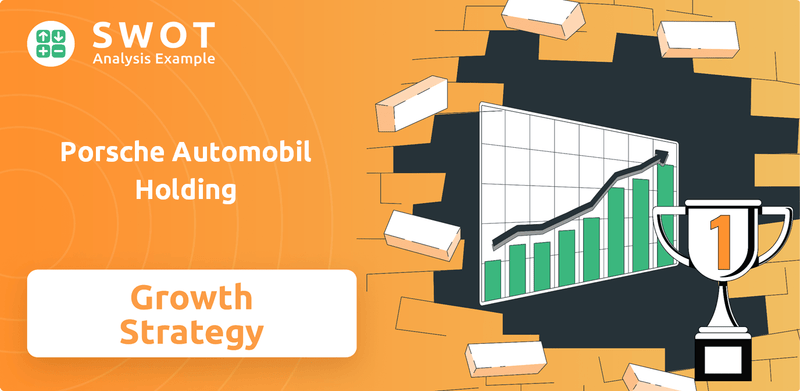
From its roots as an engineering firm, Porsche SE has evolved into a major holding company, making it crucial to understand its Porsche growth strategy and future prospects. The company's strategic positioning allows it to capitalize on the dynamic shifts within the automotive industry, including the rise of electric vehicles and the importance of global market presence. This analysis will provide insights into Porsche's long-term investment potential, considering factors such as its competitive landscape analysis and the impact of economic downturns on its financial performance.
How Is Porsche Automobil Holding Expanding Its Reach?
The expansion initiatives of Porsche Automobil Holding SE are primarily linked to the strategic growth of Volkswagen AG, its main investment. While Porsche SE itself doesn't directly engage in vehicle launches or enter new markets, its financial success is closely tied to Volkswagen's global strategies. These strategies include expansion in key markets like China and North America, along with a strong focus on electric vehicle (EV) production and digital services. The company's growth is intrinsically linked to Volkswagen's global expansion, product pipeline, and strategic partnerships.
Volkswagen AG is making significant investments in new EV platforms, such as the Scalable Systems Platform (SSP), slated to debut around 2026. Additionally, Volkswagen is developing software capabilities through Cariad. These initiatives directly benefit Porsche SE, boosting the overall value and profitability of its primary investment. Porsche SE's ability to capitalize on emerging trends and technological advancements within the automotive ecosystem is a key part of its strategy.
Furthermore, Porsche SE actively seeks new investment opportunities within the automotive and mobility sectors, going beyond its Volkswagen stake. This includes potential investments in new technologies, startups, or companies that align with the future of mobility, such as autonomous driving, battery technology, and sustainable solutions. These targeted investments aim to diversify its revenue streams and stay ahead of industry changes, potentially accessing new growth areas and mitigating risks associated with reliance on a single major investment. Porsche SE's strategic focus remains on long-term value creation, leveraging its financial strength to capitalize on emerging trends and technological advancements within the broader automotive ecosystem.
Volkswagen's continued expansion in China is a key driver for Porsche Automobil Holding. In 2023, Volkswagen delivered over 3.2 million vehicles in China. This strong performance in the Chinese market significantly contributes to the financial health of Porsche SE, as Volkswagen's success directly impacts its investment.
Volkswagen's investment in electric vehicles, including the development of the SSP platform, is crucial. The SSP platform, expected to launch around 2026, will be a cornerstone of Volkswagen's future EV production. This strategic shift towards EVs is essential for long-term growth and aligns with global trends in the automotive industry. The Owners & Shareholders of Porsche Automobil Holding benefit from the success of these ventures.
Porsche SE's proactive approach to exploring new investment opportunities is vital for its future. This includes potential investments in areas like autonomous driving, battery technology, and sustainable solutions. These investments are aimed at diversifying revenue streams and mitigating risks associated with relying on a single major investment.
Porsche SE's strategic focus remains on long-term value creation. The company leverages its financial strength to capitalize on emerging trends and technological advancements within the broader automotive ecosystem. This approach is designed to ensure sustainable growth and adapt to the evolving automotive landscape.
Porsche Automobil Holding's expansion is centered around Volkswagen's growth and strategic investments. These efforts are designed to capitalize on the evolving automotive landscape and ensure long-term value creation. The company's focus on the future of mobility, including EVs and digital services, is crucial for sustained success.
- Expansion in China and North America.
- Development of the SSP platform for EVs.
- Investment in new technologies like autonomous driving.
- Focus on long-term value creation and sustainable solutions.
Porsche Automobil Holding SWOT Analysis
- Complete SWOT Breakdown
- Fully Customizable
- Editable in Excel & Word
- Professional Formatting
- Investor-Ready Format
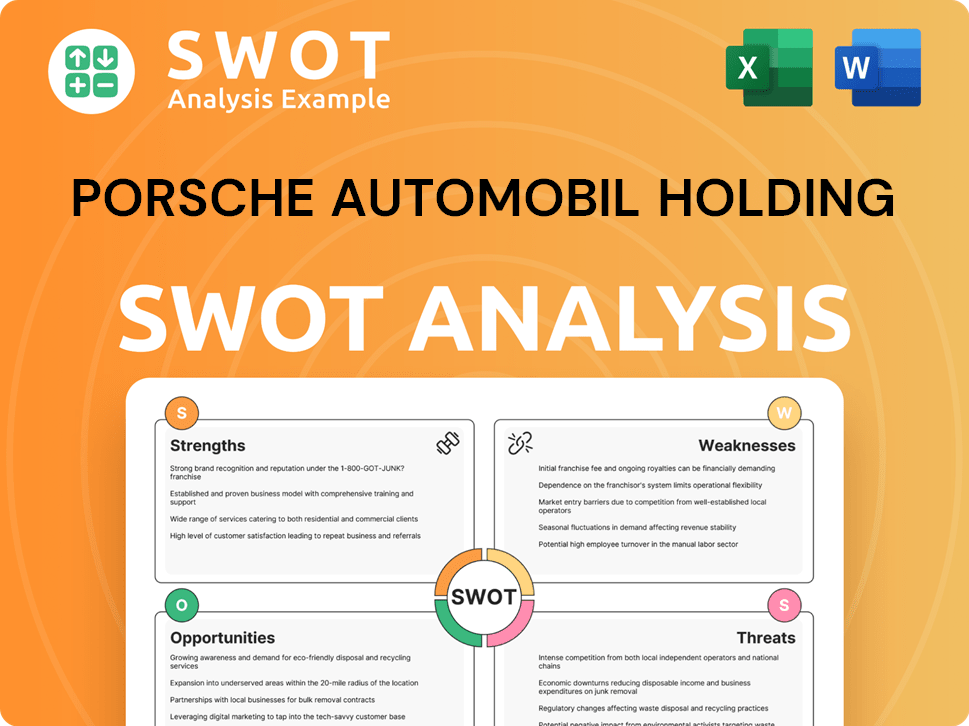
How Does Porsche Automobil Holding Invest in Innovation?
The innovation and technology strategy of Porsche Automobil Holding SE is closely tied to that of Volkswagen AG, given its significant shareholding. This relationship is crucial for understanding Porsche's future prospects in the automotive industry. Volkswagen AG is making substantial investments in research and development, particularly in the areas of electrification, digitalization, and autonomous driving, which directly benefit Porsche SE.
Volkswagen Group's strategic investments are a key driver for Porsche's growth strategy. For instance, the group plans to invest approximately €180 billion in its five-year plan from 2023 to 2027, with a major portion allocated to electrification and digitalization. These investments include the development of new electric vehicle architectures, advanced battery technologies, and robust software platforms through its subsidiary Cariad. Porsche SE profits from these advancements, enhancing the competitiveness and future prospects of its core investment.
Beyond its reliance on Volkswagen, Porsche SE actively pursues its own innovation strategy. This involves identifying and investing in promising technologies and companies within the mobility sector. The company evaluates startups and established firms at the forefront of artificial intelligence, connectivity, sustainable energy solutions, and advanced manufacturing processes. This approach allows Porsche SE to gain exposure to cutting-edge innovations that can drive long-term growth and complement its existing portfolio. The company’s focus on sustainable initiatives, such as Volkswagen’s push towards carbon-neutral production and electric vehicle adoption, also aligns with global trends and contributes to a future-proof investment strategy.
Volkswagen Group's investment in R&D is a cornerstone of Porsche's innovation strategy. The group's five-year plan (2023-2027) includes a significant allocation of approximately €180 billion to electrification and digitalization. This investment directly supports Porsche's future prospects.
A substantial portion of Volkswagen's R&D investment focuses on electrification and digitalization. This includes the development of new electric vehicle architectures, advanced battery technologies, and robust software platforms. These advancements are crucial for Porsche's long-term success.
Volkswagen's subsidiary, Cariad, plays a key role in developing software platforms and digital solutions. Cariad's innovations are directly integrated into Porsche vehicles, enhancing their technological capabilities and market competitiveness. This benefits the Marketing Strategy of Porsche Automobil Holding.
Porsche SE also invests in promising technologies and companies within the mobility sector. This includes evaluating startups and established firms in areas such as artificial intelligence, connectivity, and sustainable energy. These investments aim to complement its existing portfolio and drive future growth.
Volkswagen's push towards carbon-neutral production and electric vehicle adoption aligns with global trends. Porsche SE's focus on sustainability contributes to a future-proof investment strategy. This focus on sustainability enhances the company's long-term investment potential.
While specific patents or industry awards are generally attributed to the operating companies, Porsche SE's strategic investments capitalize on technological breakthroughs indirectly. This contributes to its overall growth objectives by fostering innovation across the automotive value chain.
Porsche SE's investments focus on key technological areas to drive innovation and growth.
- Artificial Intelligence (AI): Investments in AI-driven technologies to enhance vehicle performance and user experience.
- Connectivity: Focus on connected car technologies to improve vehicle functionality and data-driven services.
- Sustainable Energy Solutions: Investments in sustainable energy and electric vehicle technologies to support environmental goals.
- Advanced Manufacturing Processes: Focus on advanced manufacturing to improve efficiency and production quality.
Porsche Automobil Holding PESTLE Analysis
- Covers All 6 PESTLE Categories
- No Research Needed – Save Hours of Work
- Built by Experts, Trusted by Consultants
- Instant Download, Ready to Use
- 100% Editable, Fully Customizable
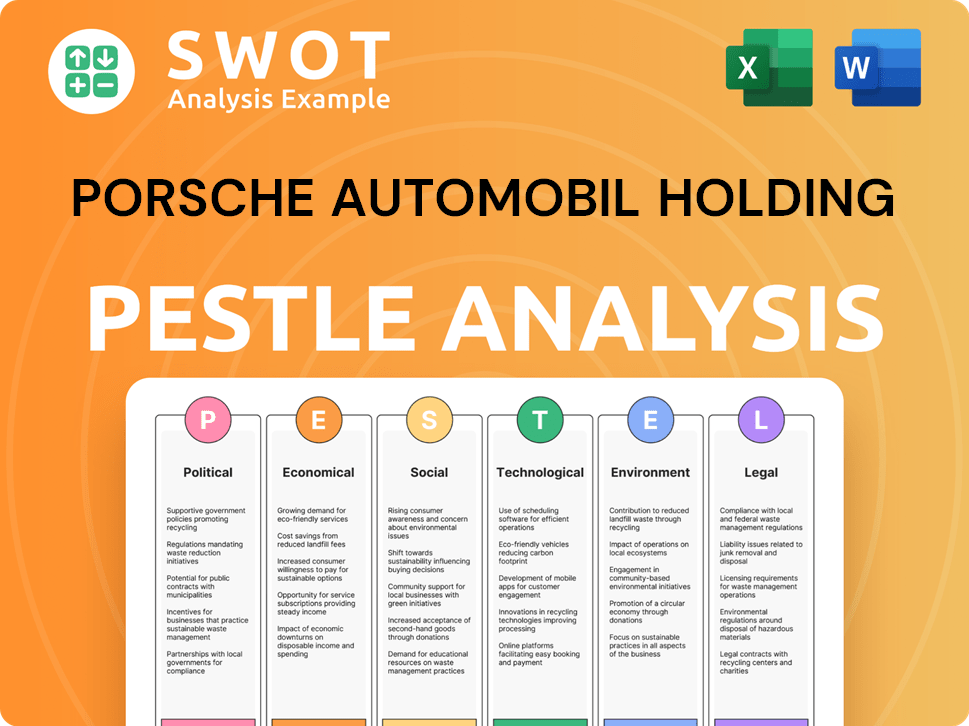
What Is Porsche Automobil Holding’s Growth Forecast?
The financial outlook for Porsche Automobil Holding SE is closely tied to the performance of Volkswagen AG, its primary investment. For the fiscal year 2023, Porsche SE reported a group result after tax of €5.694 billion, largely due to the earnings contribution from its stake in Volkswagen AG. This highlights the significance of Volkswagen's performance on Porsche SE's financial health.
Looking ahead, Porsche SE anticipates a group result after tax between €4.0 billion and €6.0 billion for the fiscal year 2024. This projection reflects expected fluctuations in the valuation of its core investment in Volkswagen. The company's financial strategy is designed to maintain a solid liquidity position and support its growth ambitions, navigating potential market volatility.
Porsche SE’s investment strategy focuses on preserving and optimizing its stake in Volkswagen AG, alongside strategic investments in automotive and mobility technologies. The company's long-term financial goals are centered on sustainable value creation for its shareholders, achieved through dividends from Volkswagen and capital gains from its investment portfolio. For more insights, you can explore the Revenue Streams & Business Model of Porsche Automobil Holding.
The financial performance of Porsche Automobil Holding is significantly influenced by its investment in Volkswagen AG. The company's financial results are directly correlated with Volkswagen's profitability and market position. This reliance underscores the importance of monitoring Volkswagen's performance for assessing Porsche SE's financial health.
Porsche SE's investment strategy primarily revolves around maintaining and optimizing its stake in Volkswagen AG. The company also makes targeted investments in automotive and mobility technologies. This approach aims to create long-term value for shareholders through dividends and capital gains.
The future prospects of Porsche Automobil Holding are closely linked to the automotive industry's trends. The company is positioned to benefit from Volkswagen's strong market position and strategic investments. The company's financial outlook for 2024 reflects anticipated fluctuations in the valuation of its core investment.
Key financial metrics for Porsche SE include the group result after tax, which was €5.694 billion in 2023. The expected range for 2024 is between €4.0 billion and €6.0 billion. These figures are crucial indicators of the company's financial performance and its ability to create value for its shareholders.
Porsche Automobil Holding Business Model Canvas
- Complete 9-Block Business Model Canvas
- Effortlessly Communicate Your Business Strategy
- Investor-Ready BMC Format
- 100% Editable and Customizable
- Clear and Structured Layout
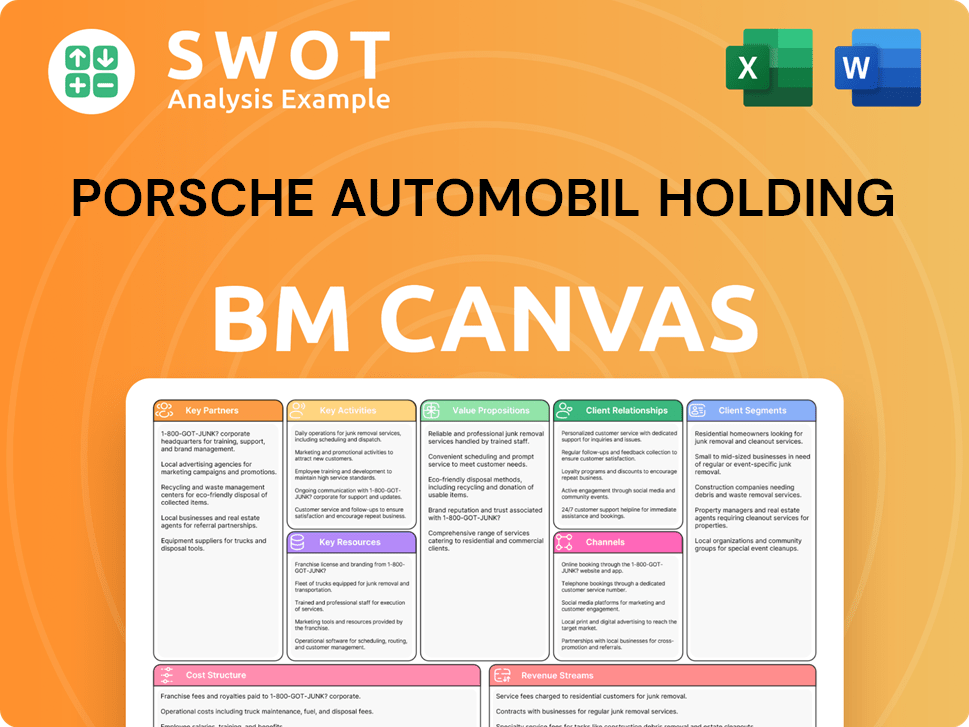
What Risks Could Slow Porsche Automobil Holding’s Growth?
Porsche Automobil Holding SE faces several risks that could affect its growth, primarily due to its substantial investment in Volkswagen AG and the broader automotive industry. These risks include intense market competition, regulatory changes, supply chain vulnerabilities, and technological disruptions. Understanding these potential obstacles is crucial for assessing Porsche's future prospects and its investment potential.
The automotive industry is dynamic, with established players and new entrants constantly vying for market share, especially in the rapidly growing electric vehicle (EV) segment. Regulatory changes, such as stricter emission standards and sustainability requirements, necessitate significant R&D investments from Volkswagen AG. Supply chain issues, as seen with recent semiconductor shortages, continue to pose challenges for automotive production. These factors create a complex environment for Porsche's growth strategy.
Technological advancements in autonomous driving, connectivity, and new energy vehicle technologies require continuous adaptation and substantial capital expenditure. Internal resource constraints, such as the availability of skilled labor and the pace of digital transformation within Volkswagen, could also affect its efficiency and competitiveness. These factors can influence Porsche's stock performance forecast.
The automotive market is intensely competitive, with established brands and new EV entrants. Competition in the EV market is particularly fierce, with companies like Tesla and various Chinese manufacturers increasing their market share. This competitive landscape impacts Porsche's market share analysis and overall financial performance.
Stricter emission standards and sustainability requirements globally require significant investment in R&D. The European Union's increasingly stringent emission targets and the push for sustainable manufacturing processes pose challenges. These regulations necessitate substantial investments to remain compliant, affecting Porsche's financial reports review.
Supply chain disruptions, such as semiconductor shortages and raw material price fluctuations, continue to impact production. The automotive industry has faced significant challenges in securing components, leading to production delays and increased costs. These disruptions can affect Porsche's global market presence and profitability.
Advancements in autonomous driving, connectivity, and EV technologies require continuous adaptation and investment. The rapid pace of technological change in the automotive sector demands significant capital expenditure. This includes investments in software, battery technology, and autonomous driving systems, influencing Porsche's innovation in automotive technology.
The availability of skilled labor and the pace of digital transformation within Volkswagen can affect efficiency. The automotive industry faces challenges in attracting and retaining skilled workers, particularly in areas like software development and EV technology. Digital transformation efforts also require significant investment and organizational change, affecting Porsche's competitive landscape analysis.
Geopolitical tensions and increasing protectionism could impact global sales and supply chains. Trade wars, political instability, and changes in economic policies can disrupt global supply chains and affect market access. These factors can influence Porsche's impact of economic downturns and investment decisions.
Porsche SE mitigates these risks through its diversified investment approach within the automotive sector and by monitoring Volkswagen AG's risk management frameworks. For example, Volkswagen AG has demonstrated resilience in overcoming challenges like the "dieselgate" scandal and recent supply chain disruptions. Emerging risks include geopolitical tensions and rising protectionism, which could affect global sales and supply chains, shaping the future trajectory of both Volkswagen and, consequently, Porsche SE. To better understand the customer base, you can learn about the Target Market of Porsche Automobil Holding.
Collaborations with technology firms and other automakers can help mitigate risks. Partnerships can provide access to new technologies, shared resources, and expanded market reach. Strategic alliances can also help with innovation and cost reduction, impacting Porsche's strategic partnerships and long-term competitiveness.
Analyzing financial reports and monitoring key performance indicators (KPIs) is crucial. Regular reviews of financial statements, including revenue, profit margins, and cash flow, help in assessing the company's financial health. Monitoring KPIs like sales volume, market share, and operational efficiency is essential for investment analysis.
Focus on sustainability initiatives, including EV development and eco-friendly manufacturing processes. The automotive industry is under increasing pressure to reduce its environmental impact. Investments in electric vehicles, renewable energy, and sustainable manufacturing can improve brand reputation and long-term viability, influencing Porsche's sustainability initiatives.
Expanding into new markets, especially in China, can diversify revenue streams. The Chinese market is a significant growth opportunity for automakers. Expanding presence in China can help reduce dependence on existing markets and boost overall revenue, influencing Porsche's expansion plans in China.
Porsche Automobil Holding Porter's Five Forces Analysis
- Covers All 5 Competitive Forces in Detail
- Structured for Consultants, Students, and Founders
- 100% Editable in Microsoft Word & Excel
- Instant Digital Download – Use Immediately
- Compatible with Mac & PC – Fully Unlocked
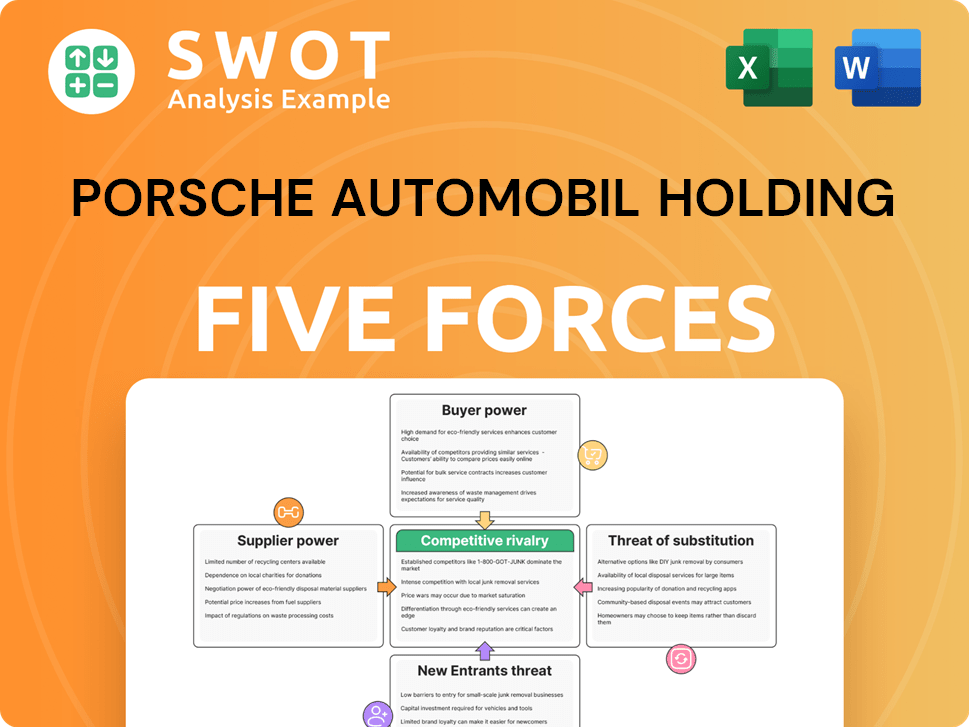
Related Blogs
- What are Mission Vision & Core Values of Porsche Automobil Holding Company?
- What is Competitive Landscape of Porsche Automobil Holding Company?
- How Does Porsche Automobil Holding Company Work?
- What is Sales and Marketing Strategy of Porsche Automobil Holding Company?
- What is Brief History of Porsche Automobil Holding Company?
- Who Owns Porsche Automobil Holding Company?
- What is Customer Demographics and Target Market of Porsche Automobil Holding Company?
Disclaimer
All information, articles, and product details provided on this website are for general informational and educational purposes only. We do not claim any ownership over, nor do we intend to infringe upon, any trademarks, copyrights, logos, brand names, or other intellectual property mentioned or depicted on this site. Such intellectual property remains the property of its respective owners, and any references here are made solely for identification or informational purposes, without implying any affiliation, endorsement, or partnership.
We make no representations or warranties, express or implied, regarding the accuracy, completeness, or suitability of any content or products presented. Nothing on this website should be construed as legal, tax, investment, financial, medical, or other professional advice. In addition, no part of this site—including articles or product references—constitutes a solicitation, recommendation, endorsement, advertisement, or offer to buy or sell any securities, franchises, or other financial instruments, particularly in jurisdictions where such activity would be unlawful.
All content is of a general nature and may not address the specific circumstances of any individual or entity. It is not a substitute for professional advice or services. Any actions you take based on the information provided here are strictly at your own risk. You accept full responsibility for any decisions or outcomes arising from your use of this website and agree to release us from any liability in connection with your use of, or reliance upon, the content or products found herein.